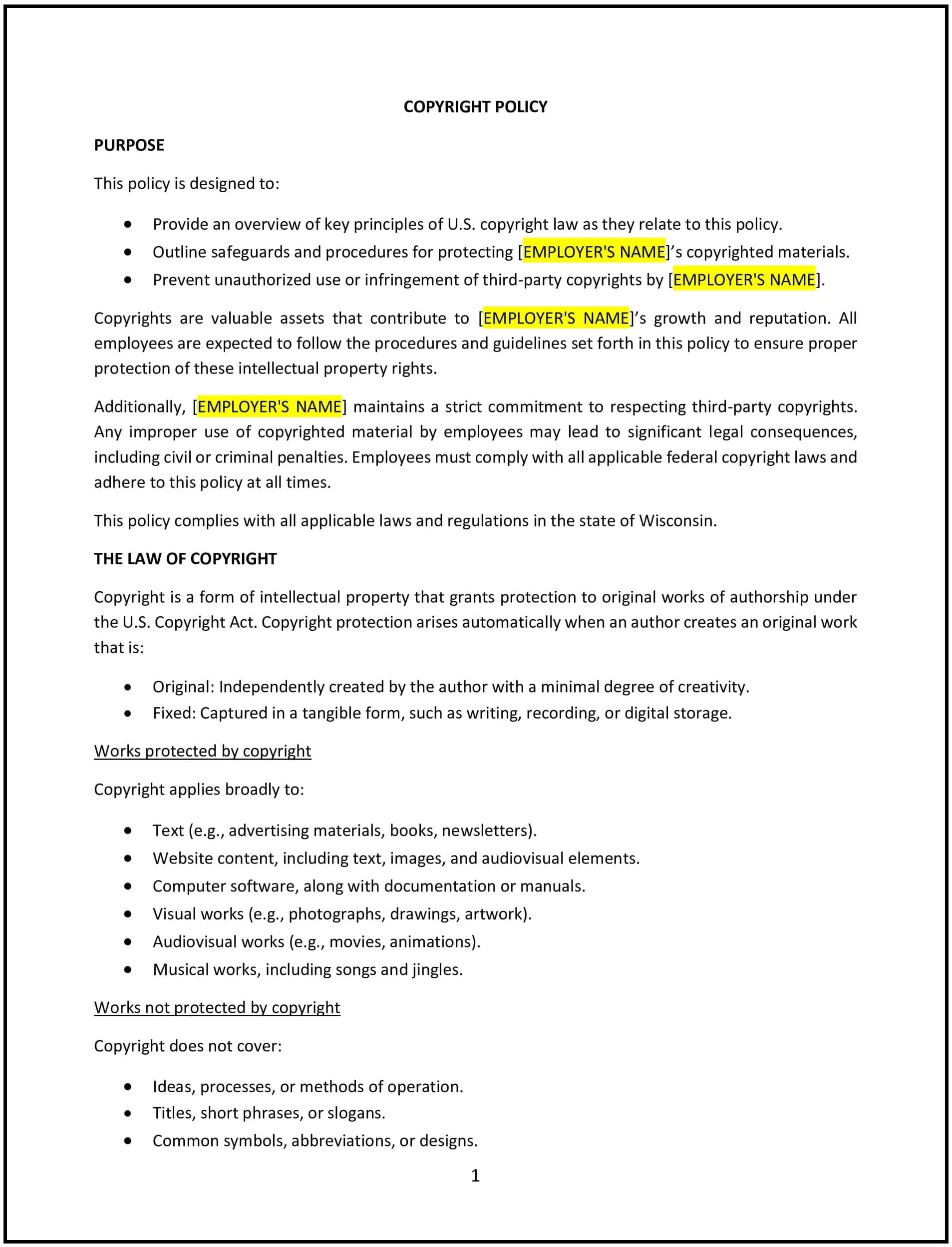Got contracts to review? While you're here for policies, let Cobrief make contract review effortless—start your free review now.

Customize this template for free
Copyright policy (Wisconsin)
A copyright policy helps Wisconsin businesses protect their intellectual property, promote compliance with copyright laws, and establish clear guidelines for using, sharing, and licensing copyrighted materials. This policy outlines how the company handles its own copyrighted works, respects the copyrights of others, and ensures employees understand their obligations when it comes to using copyrighted content.
By implementing this policy, businesses can mitigate the risk of copyright infringement, protect their creations, and maintain a culture of respect for intellectual property.
How to use this copyright policy (Wisconsin)
- Define copyrighted works: Specify what types of works are considered copyrighted by the company, such as written materials, software, designs, logos, and multimedia content. Clarify whether the company holds copyrights on these works or if they are licensed from third parties.
- Outline employee responsibilities: Define the responsibilities of employees regarding copyrighted materials, including what they can and cannot do with company-owned or third-party copyrighted works. This includes using copyrighted content in compliance with licensing agreements and obtaining proper permissions before using copyrighted materials.
- Address internal use of copyrighted materials: Set guidelines for using copyrighted content within the company, including how employees can access and use company-owned copyrighted materials for work purposes, and ensure that these works are used appropriately and for legitimate business needs.
- Specify handling of third-party content: Clarify the process for using third-party copyrighted materials, such as requiring employees to obtain proper licenses or permissions before using content not owned by the company. Ensure that employees understand how to check for usage rights and adhere to licensing terms.
- Address copyright infringement: Outline the steps the company will take if it becomes aware of copyright infringement, including how employees should report suspected infringements, how investigations will be conducted, and the consequences of copyright violations.
- Provide guidelines for licensing: If the company licenses its own copyrighted works to others, define the terms and conditions under which these works can be licensed, including the duration of the license, restrictions on use, and financial arrangements.
- Promote respect for intellectual property: Encourage employees to respect the copyrights of others, avoid unauthorized copying or distribution, and promote ethical use of content in their work.
Benefits of using this copyright policy (Wisconsin)
This policy offers several benefits for Wisconsin businesses:
- Protects intellectual property: The policy helps safeguard the company’s copyrighted works by providing clear guidelines on how they should be used, licensed, and protected.
- Reduces legal risks: By improving compliance with copyright laws and outlining procedures for addressing infringement, the policy helps reduce the risk of legal disputes, penalties, and reputational damage.
- Promotes ethical behavior: The policy fosters a culture of respect for intellectual property by educating employees on copyright laws and encouraging ethical use of copyrighted materials.
- Enhances brand protection: By protecting copyrighted materials, businesses can safeguard their brands, logos, and other proprietary works from misuse or unauthorized use by others.
- Supports legal compliance: The policy helps improve the company’s compliance with both Wisconsin state and federal copyright laws, avoiding legal violations and potential financial liabilities.
Tips for using this copyright policy (Wisconsin)
- Communicate the policy clearly: Ensure all employees understand the importance of copyright laws and their responsibilities when handling copyrighted content. Provide regular training or resources on copyright compliance.
- Regularly review copyrighted content: Review the company’s copyrighted works periodically to ensure they are properly registered, protected, and used in accordance with company policies and licensing agreements.
- Implement a reporting process: Set up a process for employees to report suspected copyright infringement or misuse, ensuring that any issues are addressed promptly and in accordance with the company’s procedures.
- Use proper licensing tools: Encourage employees to use legal and reputable sources for third-party content, and ensure that the company has valid licenses for any content it uses that is not owned in-house.
- Review and update the policy: Periodically review and update the policy to reflect any changes in copyright law or the company’s intellectual property practices, ensuring it remains relevant and effective.